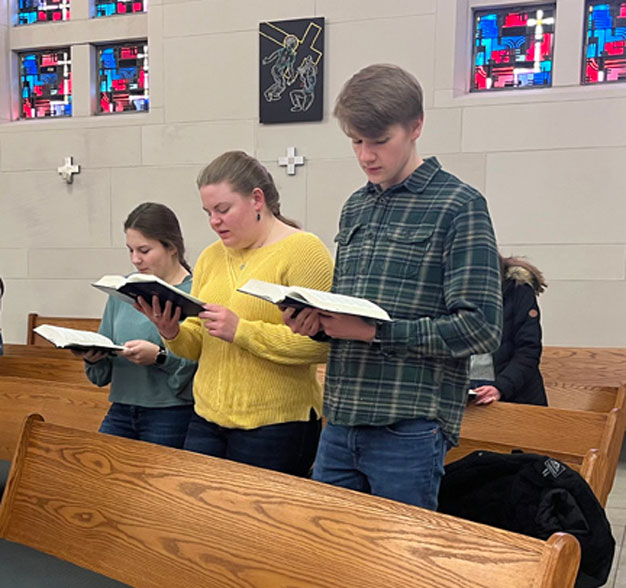
St. Ambrose University students celebrate Mass at Christ the King Chapel in Davenport on March 6.
(Members of the St. Ambrose University community in Davenport are writing reflections on daily Scripture readings during Lent. Here are a few of the reflections, edited for space. To read more reflections go to https://www.facebook.com/SAUCampus Ministry)
Nicky Gant, coordinator of Service & Justice
In today’s (March 17) Gospel, Jesus tells about the rich man who “dined sumptuously each day. And lying at his door was a poor man named Lazarus, covered with sores, who would gladly have eaten his fill of the scraps that fell from the rich man’s table.” While the rich man winds up suffering torment in the afterlife begging for mercy, the poor man is “carried away by angels into the bosom of Abraham.”
While we may not literally have a poor man at our doorstep, we have access to the internet, where TikTok videos of teenagers in warzones, suicidal young people desperately crying out for help, and news stories about local violence and human trafficking are a click away. The suffering world is closer than our doorstep now — it’s at our fingertips.
This Gospel challenges us to reflect: are we generous enough? Serving those on the margins? Sharing of the abundance we are blessed with? If we follow these deep soul questions for long enough, we are led into another kind of poverty — solidarity with the Lazaruses of our world.
Though we can all do our small part to ease the suffering of others, none of us can fix all of the world’s problems. We don’t have the power! But, we can pray for divine assistance, inspiration, energy, guidance, miraculous intervention and a softening of hardened hearts — starting with our own. As we turn ever more wholeheartedly toward the Lord in solidarity with the poor, we are enough for the Lord in spite of our shortcomings.
May we be blessed with the courage to follow the Lord in solidarity with the poor, wherever he leads us.
Ethan (professor of history) and Anne Gannaway (associate vice president for Institutional Advancement and Development)
(March 18 reflection). I remember in sixth grade that I really wanted parachute pants. They looked totally sweet! With these pantaloons, some cardboard and a boombox blasting Herbie Hancock, I was certain my breakdancing ability could reach its full potential on the Pine Hill Elementary blacktop. My parents said the pants weren’t worth it, but they obviously had no idea what they were talking about. Sadly, I never got them, but I continued my recess backspins and worms, even if ultimately my career fell short of the international fame I was sure to gain. People would have loved me!
Since our boys were young, we’ve talked about how, in order to play soccer (football proper!), all that’s required is a ball and some friends. Despite the availability of eye-catching, multicolored and patterned soccer shoes typical now, one can play with no shoes at all. Fields can be in any open space, and even the ball itself need only be something round that can be kicked. It might be just a knot of plastic, for example. In fact, I recall a story about a group of children playing with one of these makeshift balls. Then, when someone gave them a stitched soccer ball, they fought over who would take it home. The whole point of the game — enjoying the company of others in a communal endeavor — became lost in competition over the special object.
As it happens, Ambrose, our patron, devoted a whole work to Joseph, son of Jacob. Joseph’s coat, Ambrose interpreted, was decorated not with dye but with the virtues. Ambrose added that Joseph’s story shows that anyone’s “character can be of the highest quality, and that no position in life is devoid of virtue if the soul of the individual knows itself” (Joseph 4:20). By this statement, Ambrose meant that such dazzling items as technicolor dreamcoats, polychromatic soccer shoes and multicolored parachute pants are fleeting and, if overvalued, can distract us from meeting our full and lasting potential: to love others and to love God.
I guess that means Anne won’t be getting me those parachute pants now….
Emily Mohr, junior, education major
In today’s (March 21) reading, we see Naaman rejecting the advice that God has given him through Elisha, getting upset at the suggestion of curing his leprosy by washing seven times in the Jordan. When Naaman hears this, he immediately becomes angry that God did not just wave his hand and cure him, claiming that the Jordan has nothing special in it that has the ability to cure his disease. Eventually, Naaman listens to what Elisha has said and washes in the Jordan seven times, becoming clean after he is done.
Sometimes, like Naaman, it takes us a little longer to understand and accept the advice that God is giving us. We all go through trials and with those struggles come doubts, wondering if we’re doing the right thing. Living out God’s will for each of us is a huge task, and one I personally struggle with. Every decision I make factors into what my future will look like, and I’m slowly allowing myself to let it happen and listen to what God is telling me, trusting that he has me on the right track.
This Lent, I’m trying to be more open to opportunities that come my way and saying yes when I can. I’ve struggled a bit with this due to my schedule, but I’ve already seen it working in different aspects of my life. Saying yes to opportunities God has given me, and trusting that he’s leading me to where I need to be, is very comforting and has given me peace within the craziness of life.











